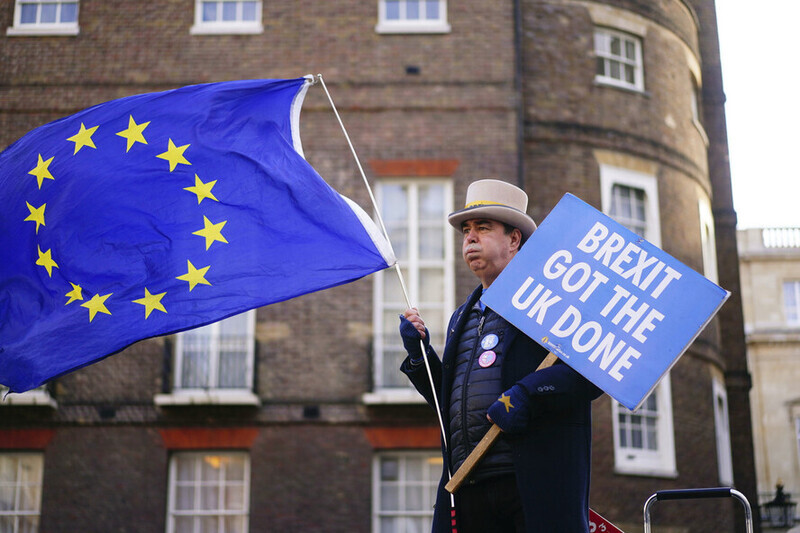hankyoreh
Links to other country sites 다른 나라 사이트 링크
[Column] Lessons for Korea in 3 years of Brexit


The final debate about Brexit was televised two days before Britain held its national referendum about whether it should leave the European Union. Boris Johnson, the Conservative lawmaker who would go on to become prime minister, spoke in support of Brexit.
“This Thursday [the day of the vote] can be our country’s independence day,” Johnson said as he concluded a long oration on the reasons for leaving the EU.
Until that point, the “remain” camp had enjoyed something of an advantage. But Johnson’s persuasive speech may have been enough to tip the balance in favor of leaving, which narrowly won the referendum by 52% to 48%.
On Jan. 31, 2020, after three and a half years of mind-numbing negotiations, the UK officially relinquished its status as a member of the EU.
Following the debate, Johnson advanced from backbencher to foreign minister and then prime minister, allowing him to personally clinch the Brexit deal.
Three more years have passed since then. In remarks on Brexit’s third anniversary, Prime Minister Rishi Sunak said the UK has “made huge strides in harnessing the freedoms unlocked by Brexit” and has “forged a path as an independent nation with confidence.”
Brexit’s achievements, Sunak said, include the world’s fastest COVID-19 vaccination program, new trade deals with more than 70 countries, an independent stance on immigration and stronger protections for the agro-livestock industry. A confident appraisal, to be sure.
But many Britons appear to see things differently. In a public opinion poll at the end of 2022, 56% of respondents said Brexit was the wrong decision, while just 32% said it was the right decision.
Even those who voted to leave in the referendum harbor doubts about the benefits of Brexit. Only 14% of “leave” voters said that Brexit had had a positive impact on the British economy, compared to 41% who said the impact has been negative.
The press has even coined the portmanteau “Bregret,” to refer to regret about Brexit.
And in truth, the British economy is not in good shape. The UK is the only advanced economy that has not returned to its pre-pandemic output. The UK’s economic growth rate in the fourth quarter of 2022 as compared to the fourth quarter of 2019 was -0.8%, which was lower than the US (5.1%), Canada (3.4%), Italy (1.8%), France (1.2%) and even Germany (0.2%).
The World Economic Outlook, a report recently published by the International Monetary Fund, projected that the UK would post economic growth of -0.6% in 2023. While major European countries, and even currently war-waging Russia, are expecting positive growth, the UK is the only one whose economy is contracting.
Economic analysts with Bloomberg estimated that the UK’s GDP would be 4% higher than at present if it had stayed in the EU. That implies that the economic cost of Brexit is close to 100 billion pounds a year.
While rising uncertainty depressed business investment in the UK compared to other countries, restrictions on the flow of workers from the EU have caused wages to rise higher in the UK than elsewhere.
The UK’s performance in the area of trade has also been below expectations. The UK has inked a raft of bilateral and multilateral trade agreements since Brexit, but its trade volume as of the second half of 2022 was the lowest of the G-7 countries. Small and medium-sized import-export firms in Britain have seen transaction costs go up since Brexit as customs procedures grow more complicated.
While Sunak was correct when he bragged that Britain’s vaccination campaign launch was the fastest in the world, that wasn’t enough to stave off grievous harm from the pandemic. The UK’s cumulative death tally from COVID-19 is 32 people per 10,000 population, which is higher than Germany (20), France (24) and Spain (25), as well as the EU average of 27.
A range of indicators suggests that British “independence” hasn’t been a smashing success.
Support for Brexit was grounded in the belief that free trade had eroded the domestic manufacturing sector and that immigrants were stealing Britons’ jobs. Instead of redistributing resources to those harmed by economic integration, politicians seized upon their pain as grist for sharpening division — and the end result was Brexit.
Looking back three years later, Britain has not achieved independence, but self-isolation.
For South Korea, a small country with an open economy, isolation would spell disaster. It’s true that opening up markets and letting in foreign workers disadvantages uncompetitive industries and low-skill workers in Korea. But our response to that disadvantage cannot be isolation.
While we should ensure that gains and losses are evenly distributed, we shouldn’t abandon exchange with the wider world. That’s the lesson Korea should learn from Britain.
Please direct questions or comments to [english@hani.co.kr]

Editorial・opinion
![[Column] Season 2 of special prosecutor probe may be coming to Korea soon [Column] Season 2 of special prosecutor probe may be coming to Korea soon](https://flexible.img.hani.co.kr/flexible/normal/500/300/imgdb/original/2024/0426/3317141030699447.jpg) [Column] Season 2 of special prosecutor probe may be coming to Korea soon
[Column] Season 2 of special prosecutor probe may be coming to Korea soon![[Column] Park Geun-hye déjà vu in Yoon Suk-yeol [Column] Park Geun-hye déjà vu in Yoon Suk-yeol](https://flexible.img.hani.co.kr/flexible/normal/500/300/imgdb/original/2024/0424/651713945113788.jpg) [Column] Park Geun-hye déjà vu in Yoon Suk-yeol
[Column] Park Geun-hye déjà vu in Yoon Suk-yeol- [Editorial] New weight of N. Korea’s nuclear threats makes dialogue all the more urgent
- [Guest essay] The real reason Korea’s new right wants to dub Rhee a founding father
- [Column] ‘Choson’: Is it time we start referring to N. Korea in its own terms?
- [Editorial] Japan’s rewriting of history with Korea has gone too far
- [Column] The president’s questionable capacity for dialogue
- [Column] Are chaebol firms just pizza pies for families to divvy up as they please?
- [Column] Has Korea, too, crossed the Rubicon on China?
- [Correspondent’s column] In Japan’s alliance with US, echoes of its past alliances with UK
Most viewed articles
- 1Is Japan about to snatch control of Line messenger from Korea’s Naver?
- 2‘We must say no’: Seoul defense chief on Korean, USFK involvement in hypothetical Taiwan crisis
- 3The dream K-drama boyfriend stealing hearts and screens in Japan
- 4[Editorial] Korea’s surprise Q1 growth requires objective assessment, not blind fanfare
- 5Division commander ordered troops to enter raging flood waters before Marine died, survivor says
- 6No good, very bad game for Korea puts it out of Olympics for first time since 1988
- 7S. Korea “monitoring developments” after report of secret Chinese police station in Seoul
- 8[Editorial] New weight of N. Korea’s nuclear threats makes dialogue all the more urgent
- 9[Reportage] On US campuses, student risk arrest as they call for divestment from Israel
- 10[Reporter’s notebook] To accept migrants isn’t enough — Korea must fight their exploitation